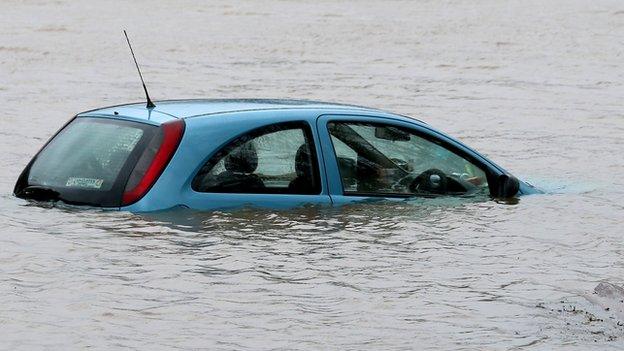Storm Dennis: Why do drivers keep misjudging flooded fords?
- Published
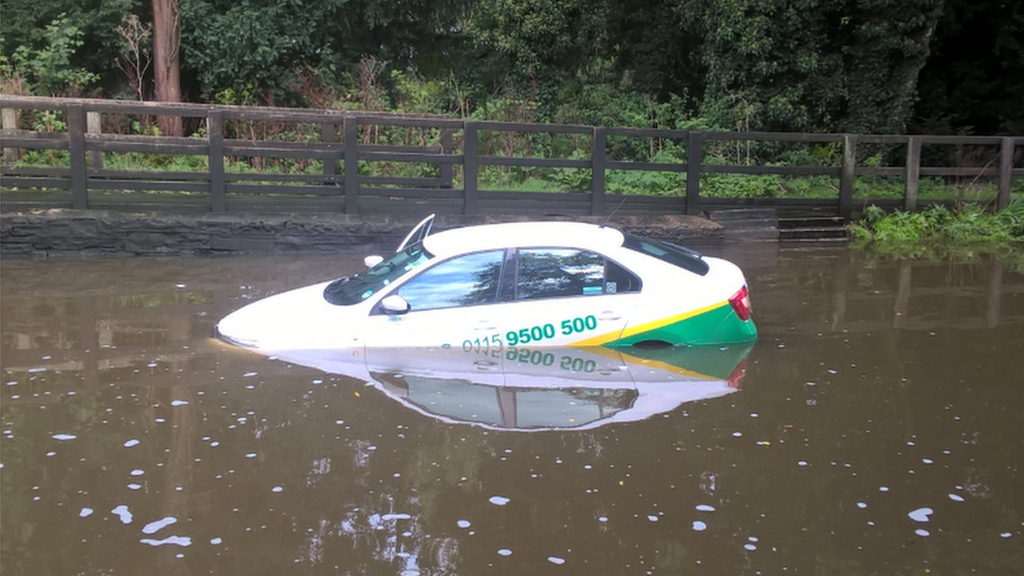
Rufford Lane ford in Nottinghamshire is one of the top spots for the most flood rescues in England
Another rainy season brings another deluge of pictures flooding social media showing drivers getting into deep water. According to the Environment Agency, 74% of us would risk driving through floodwater, despite this being the leading cause of death during floods. Why are we so casual about the risk?
For people living near the aptly named Watery Gate Lane, in Leicestershire, and Rufford Lane, in Nottinghamshire, the sight of stranded cars is a regular spectacle - the two locations are the worst flood rescue hotspots in the country, external.
"For much of the year, the ford is just a couple of inches deep so it presents no problem whatsoever," says Andrew Cox, general manager of Rufford Mill, a wedding venue near Rufford's ford.
"But there's a lot of run-off from the surrounding countryside so the ford can go as deep as five feet and becomes impassable. Highways England put up signs warning people the road is closed but sometimes people choose to ignore them."
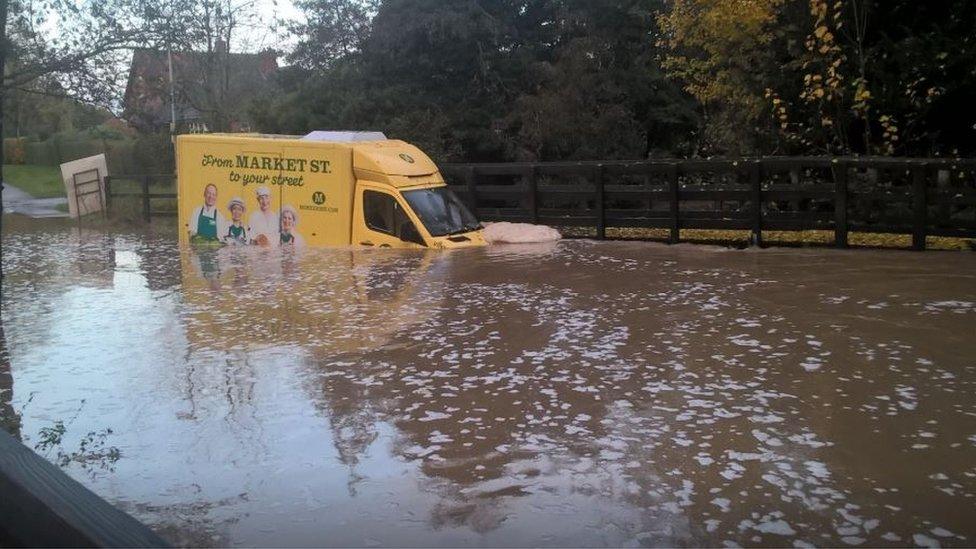
"It can be very distressing for those inside the vehicles, who end up in wet clothes and very frightened"
Although avoiding the ford only involves a four-mile detour, drivers occasionally decide to chance it, Mr Cox says.
"It can be very distressing for those inside the vehicles, who end up in wet clothes and very frightened.
"Possibly drivers feel complacent. Because it is a ford, there's always water on the road. Sometimes people need to take responsibility for their actions, harsh though that may sound."

The fire service regularly issues warnings about the depth of water at Watery Gate ford in Leicestershire
"It is concerning so many drivers are willing to risk their own life and the lives of others by driving through floodwater," says Caroline Douglass, the Environment Agency's director for incident management.
"The key thing is people don't understand the risks they face. They are inside what they think to be a pretty safe vehicle.
"They don't realise 30cm of flowing water is enough to float your car - that's just the height of a school ruler. Nor do they understand how fast that water can flow.
"Once your car is floating, there's nothing you can do to control it. It's very frightening.
"It's better to be safe than stranded - and there is a very obvious risk to life. The water is very cold, it can contain unseen debris and people can get swept away."
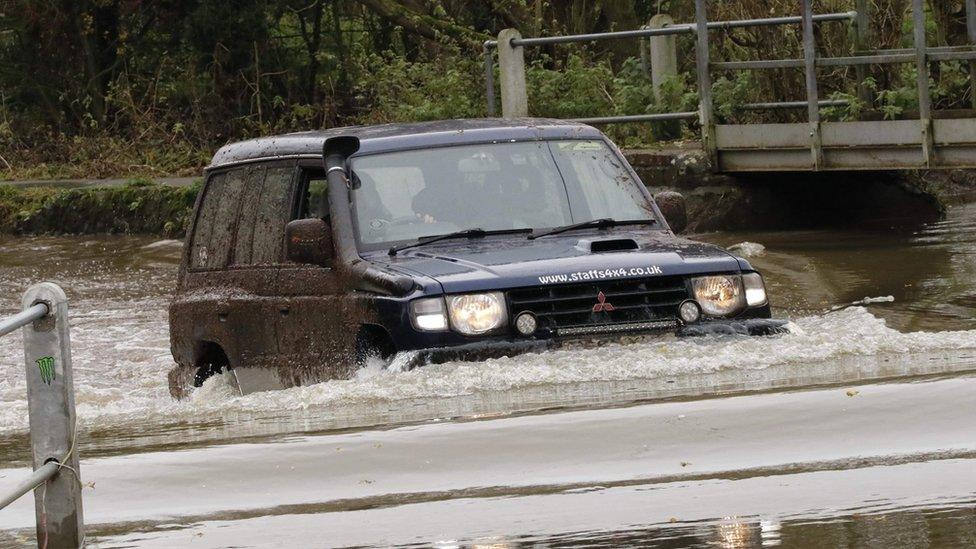
Jason Gulliver says he regularly drives through Watery Gate but advises drivers "who are daft enough to try it in a Fiesta" to turn around
Gates costing £65,000 are set to installed at Watery Gate, in a bid to stop reckless motorists getting stranded.
"At Watery Gate there are already more than 10 signs stating, 'Deep ford' and 'Check depth gauge' and in floods the ford looks like a brown fishing lake," says maintenance engineer Jason Gulliver.
Mr Gulliver, from Ibstock in Leicestershire, believes drivers need to be more aware of their vehicles' limitations.
While he has driven through Watery Gate "many times" to rescue stranded vehicles from the ford, he says his 4x4 has been modified to allow this.
You might also like:
"Sometimes I'll head to Watery Gate to wash the car off," he says. "The locals don't seem to mind and I have had a few even taking photographs as I've crossed."
He says the onus is on drivers to know their vehicle's capabilities and to turn back if the depth gauge suggests the ford is dangerous.
"You wouldn't try to drive across the Channel just because it's the shortest route, unless you're amphibious."
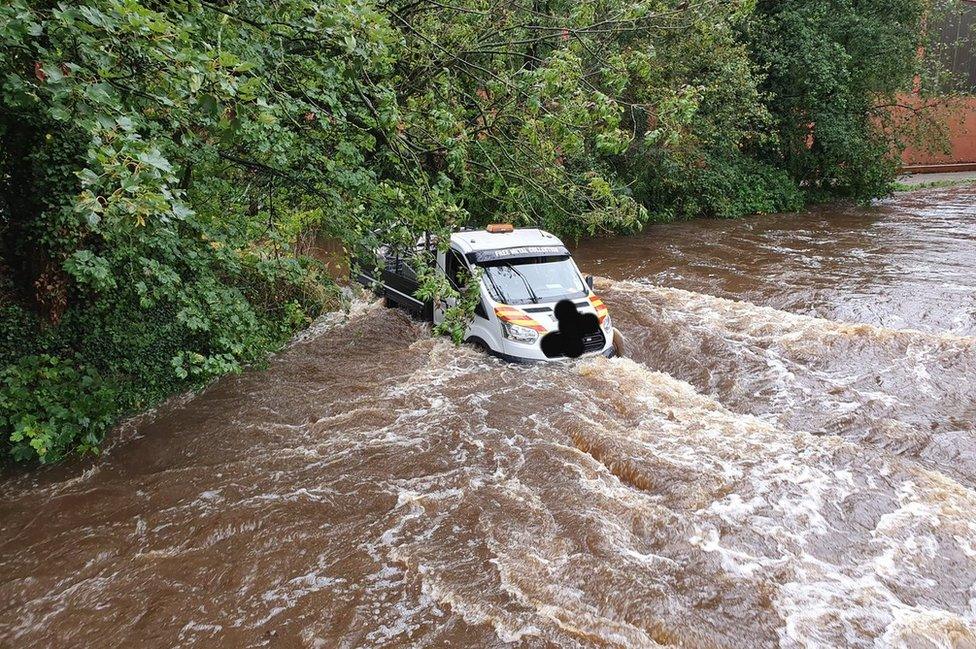
This driver, who had to be rescued from a North Yorkshire river, blamed his-sat nav for his predicament
It is easy to be critical of those at the wheel - and many on social media are unsparing in their scorn for the drivers of sunken Citroens and floating Fords.
"I find it so funny when people try it," wrote Cliff Baker. "I mean, seriously, where are the brain cells in some people's heads?"
"I really don't understand why drivers attempt it... the fact the water is FAR too high! #stupid," wrote Rachel Parker.
Even the emergency services have been known to join in.
When two men and a dog had to be helped from a vehicle after it became stuck while trying to cross a ford in North Yorkshire, Andy Creasey, from the fire service, tweeted, external: "I had one question only... why did you attempt this? The response was 'my sat-nav said this way'.
"Unbelievable stupidity."
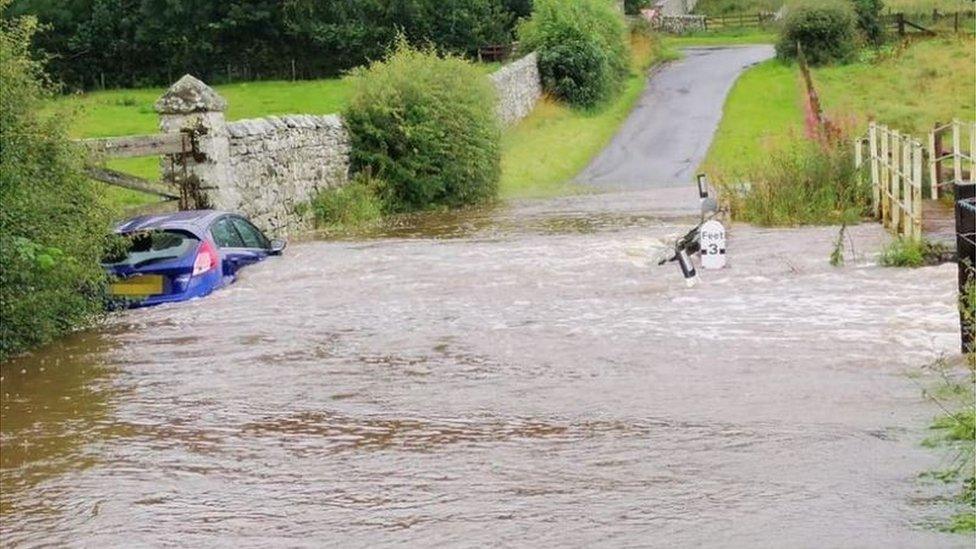
Many people think they are better drivers than is actually the case
"Driving can give us a false sense of control," says Dr William Van Gordon, associate professor of contemplative psychology at the University of Derby.
"Because we are in control of the car, we also think we are in control of the road and that just isn't the case.
"Around 80-90% of drivers think they are of above-average driving ability. That combines with habitual patterns - if people are in the habit of using the road without difficulty, they tend to believe they will never experience problems."
A study conducted in the journal Safety Science in 2016, external found people who are "easily influenced by social expectations" were more likely to give it a go, Dr Van Gordon says - for example, somebody with a friend in the car who wants to get home.
"People who consider themselves to have a high driving ability are more likely to try than others who aren't so confident. It also comes down to a general lack of awareness that flooded roads pose a risk."
"In general, we are poor at assessing risk when it comes to driving."
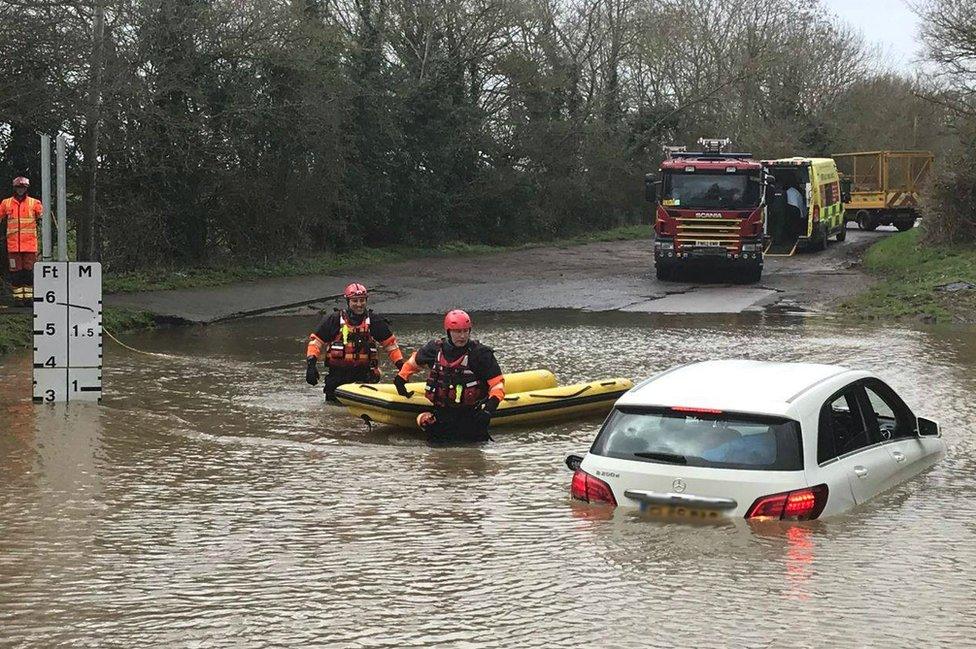
Experts say drivers are generally "poor" when it comes to assessing risks
Dr Elliot Ludvig, a researcher in the University of Warwick's department of psychology, agrees. "If certain risks happen quite rarely, people tend to undervalue them," he says.
Dr Ludvig, who grew up in Canada, now lives near the ford at Sarehole Mill, in Birmingham. "The first time I saw it, it was crazy," he says. "I had never seen water on the road. It's just not a thing where I grew up.
"When a sat-nav sent me down there, I didn't realise I was actually supposed to put my car into the water to get across. The second time, I had my kids in the car and they loved it, so we had to do it because it was fun.
"I have run by it and seen stranded cars under the bridge. I do cross it, but not when it's rained."
He wonders whether social media could prove useful in terms of raising awareness of the risks of flooding to drivers.
"There's often a social media pile-on when a car gets stranded," he says.
"You would think the fact you can see pictures of people doing this might give you the idea it could possibly happen."

Follow BBC East Midlands on Facebook, external, Twitter, external, or Instagram, external. Send your story ideas to eastmidsnews@bbc.co.uk, external.
- Published8 April 2019

- Published22 January 2018

- Published3 May 2015
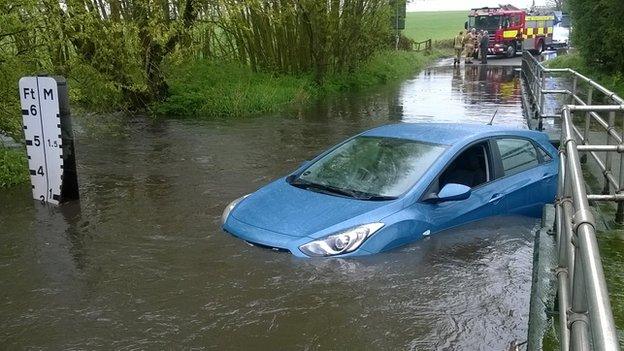
- Published14 November 2014
